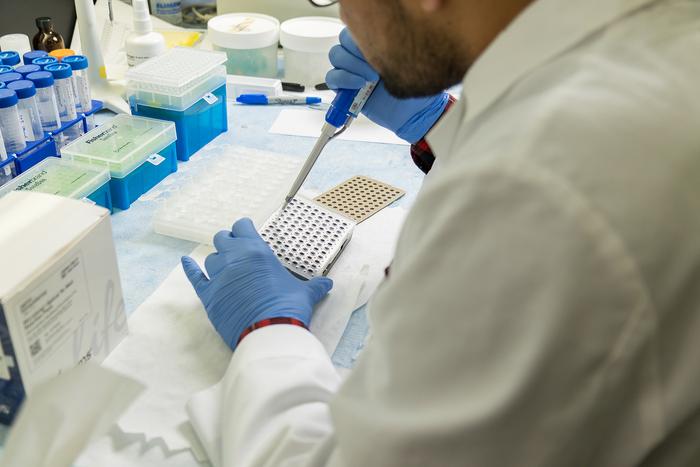Imagine if scientists developed a customizable cancer vaccine that was available — and affordable — for everyone. What if a patient scheduled for surgery also had the option of taking a pill whose composition includes nanorobotics capable of performing the procedure?

Credit: TTUHSC
Imagine if scientists developed a customizable cancer vaccine that was available — and affordable — for everyone. What if a patient scheduled for surgery also had the option of taking a pill whose composition includes nanorobotics capable of performing the procedure?
These and other medical scenarios may seem far-fetched and better suited to a science fiction thriller. However, the Advanced Research Projects Agency for Health (ARPA-H) is seeking to take such ideas from the drawing board to the patient, and the Texas Tech University Health Sciences Center (TTUHSC) will be part of the effort.
Established as part of the National Institutes of Health (NIH) in March 2022 and armed with a $1 billion budget for three years, ARPA-H is a federal funding agency that supports high-impact research capable of driving biomedical and health breakthroughs that can deliver transformative, sustainable and equitable health solutions for everyone. Its mission focuses on leveraging research advances for real world impact.
The model under which ARPA-H operates empowers visionary program managers to tackle a specific problem. To do so, program managers work with a range of partners using various approaches to solve that problem, and measurement and evaluation procedures are included throughout the process. All of this collaboration is made possible through one of three regional ARPA-H Customer Experience Hubs that comprise the nationwide ARPANET-H Health Innovation Network.
Lance R. McMahon, Ph.D., TTUHSC senior vice president for research and innovation, said ARPA-H membership will greatly facilitate the university’s ability to achieve its vision of transforming health care through innovation and collaboration, explaining that TTUHSC’s membership as a spoke of the Dallas-based ARPA-H Customer Experience Hub will robustly connect the rural communities of West Texas and Eastern New Mexico to world-class research and development in health care.
“TTUHSC is a critical access point for health care across a vast region, and ARPA-H membership will allow our communities to inform the most cutting-edge research and development in health innovation,” McMahon said. “Our spoke membership gives West Texas a voice in shaping health care innovations.”
TTUHSC is a member of the Customer Experience Hub (consortium) located at Pegasus Park in Dallas and operated by a Consortium Management Firm. The Dallas consortium unites under one centralized umbrella the capabilities from hub partners, known as spokes, located in Austin, Houston, North Texas and San Antonio.
“We wanted access to the exciting health care solutions being developed through ARPA-H, and they wanted TTUHSC in order to learn from and tailor health care advances to the communities we serve,” McMahon added.
With the addition of TTUHSC, the Dallas consortium currently includes 133 spokes representing the cancer research industry. Spokes are specialized entities whose capabilities, innovation, research and development and population access help to drive health outcomes. Spokes include for-profit and non-profit organizations, small scale businesses, government entities and academic institutions. TTUHSC is one of 14 academic partner spokes participating in the Dallas consortium.
Spokes are considered to be either performers (technology developers) or stakeholders (those impacted by new technologies), and all are eligible to compete for any work that is conducted through the consortium.
Min H. Kang, Pharm.D., associate director of the TTUHSC School of Medicine Cancer Center and a professor in the school’s Department of Pediatrics, said the ARPANET-H hub seeks to create a diverse health innovation network that uses a unique but necessary approach to reach diverse patient populations.
“As a member, TTUHSC has an opportunity to submit a proposal to the ARPANET-H hub in Dallas to be the center of the health innovation network in the West Texas area to represent the patients in the region,” Kang said. “Membership also accelerates our access to breakthrough technologies, platforms and innovative products and services for patients in the region.”
Due to geographic location and other related barriers, patients in West Texas often are excluded from nationwide clinical studies. Kang said ARPA-H membership will allow TTUHSC to break through those barriers and bring innovative clinical studies and health care measures for target prevention, treatment and diagnostic needs to West Texas patients.
“With ARPA-H support, we will have a better understanding of the patients in our region by characterizing the genetic properties of their diseases at an individual level and as a diverse group,” Kang said. “This will not only enhance the understanding of the disease, but also enable the matching of patients to nationwide clinical trials at our sites.”
In addition to improving patients’ clinical trials access, McMahon said spoke membership also is providing TTUHSC faculty a platform and voice to shape the overall development of the ARPA-H network.
“We have faculty who will propose grand health innovations to ARPA-H for potential funding,” McMahon said. “ARPA-H funding is considerable, and these proposals, if funded, have the potential to revolutionize health care delivery to our patients in West Texas and Eastern New Mexico.”
###



